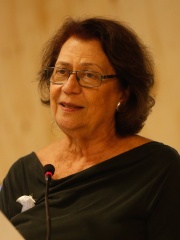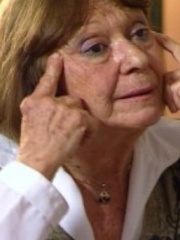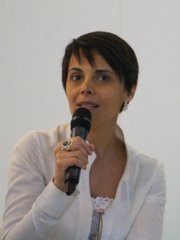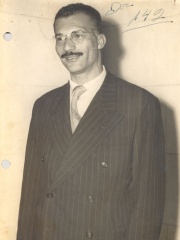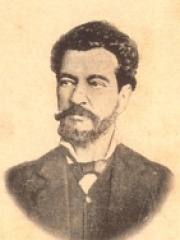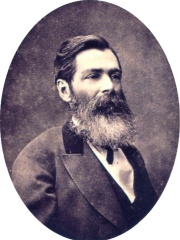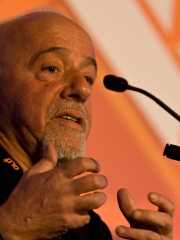
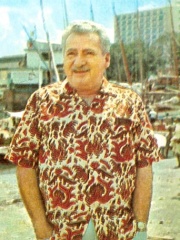
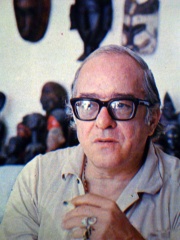

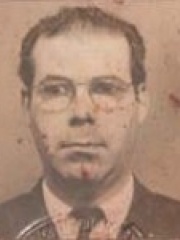
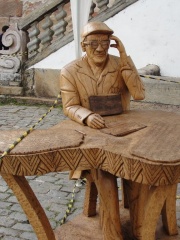
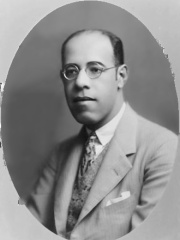
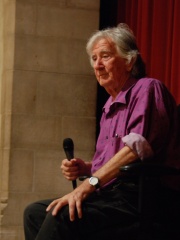
The Most Famous
WRITERS from Brazil
Top 10
The following people are considered by Pantheon to be the top 10 most legendary Brazilian Writers of all time. This list of famous Brazilian Writers is sorted by HPI (Historical Popularity Index), a metric that aggregates information on a biography's online popularity. Visit the rankings page to view the entire list of Brazilian Writers.

1. Paulo Coelho (b. 1947)
With an HPI of 81.81, Paulo Coelho is the most famous Brazilian Writer. His biography has been translated into 97 different languages on wikipedia.
Paulo Coelho de Souza ( KWEL-yoo, koo-EL-yoo, -yoh, Portuguese: [ˈpawlu kuˈeʎu]; born 24 August 1947) is a Brazilian lyricist and novelist and a member of the Brazilian Academy of Letters since 2002. His 1988 novel The Alchemist became an international best-seller.

2. Jorge Amado (1912 - 2001)
With an HPI of 73.92, Jorge Amado is the 2nd most famous Brazilian Writer. His biography has been translated into 68 different languages.
Jorge Leal Amado de Faria ( ZHOR-zhee; Brazilian Portuguese: [ˈʒɔʁʒi aˈmadu]; 10 August 1912 – 6 August 2001), known as Jorge Amado, was a Brazilian writer of the modernist school. He remains the best-known of modern Brazilian writers, with his work having been translated into some 49 languages and popularized in film, including Dona Flor and Her Two Husbands in 1976, and having been nominated for the Nobel Prize in Literature at least seven times. His work reflects the image of a Mestiço Brazil and is marked by religious syncretism. He depicted a cheerful and optimistic country that was beset, at the same time, with deep social and economic differences. He occupied the 23rd chair of the Brazilian Academy of Letters from 1961 until his death in 2001. He won the 1984 International Nonino Prize in Italy. He also was Federal Deputy for São Paulo as a member of the Brazilian Communist Party between 1947 and 1951.

3. Vinicius de Moraes (1913 - 1980)
With an HPI of 66.51, Vinicius de Moraes is the 3rd most famous Brazilian Writer. His biography has been translated into 41 different languages.
Marcus Vinícius da Cruz e Mello Moraes (19 October 1913 – 9 July 1980), better known as Vinícius de Moraes (Brazilian Portuguese: [viˈnisjuz dʒi moˈɾajs]) and nicknamed "O Poetinha" ("The Little Poet"), was a Brazilian poet, diplomat, lyricist, essayist, musician, singer, and playwright. With his frequent and diverse musical partners, including Antônio Carlos Jobim, his lyrics and compositions were instrumental in the birth and introduction to the world of bossa nova music. He recorded numerous albums, many in collaboration with noted artists, and also served as a successful Brazilian career diplomat.

4. Reinaldo Arenas (1943 - 1990)
With an HPI of 66.37, Reinaldo Arenas is the 4th most famous Brazilian Writer. His biography has been translated into 34 different languages.
Reinaldo Arenas (July 16, 1943 – December 7, 1990) was a Cuban poet, novelist, and playwright who is known as a vocal critic of Fidel Castro, the Cuban Revolution, and the Cuban government. His memoir of the Cuban dissident movement and of being a political prisoner, Before Night Falls, was dictated after his escape to the United States during the 1980 Mariel boatlift and published posthumously. Arenas, who was dying of AIDS, killed himself in 1990.
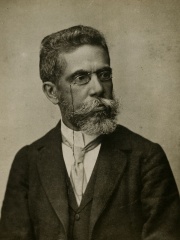
5. Machado de Assis (1839 - 1908)
With an HPI of 65.73, Machado de Assis is the 5th most famous Brazilian Writer. His biography has been translated into 51 different languages.
Joaquim Maria Machado de Assis (Portuguese: [ʒwɐˈkĩ maˈɾiɐ maˈʃadu d͡ʒ(i) aˈsis]), often known by his surnames as Machado de Assis, Machado, or Bruxo do Cosme Velho (21 June 1839 – 29 September 1908), was a pioneer Brazilian novelist, poet, playwright and short story writer, widely regarded as the greatest writer of Brazilian literature. In 1897, he founded and became the first President of the Brazilian Academy of Letters. He was multilingual, having taught himself French, English, German and Greek later in life. Born in Morro do Livramento, Rio de Janeiro, from a poor family, he was the grandson of freed slaves in a country where slavery would not be fully abolished until 49 years later. He barely studied in public schools and never attended university. With only his own intellect and autodidactism to rely on, he struggled to rise socially. To do so, he took several public positions, passing through the Ministry of Agriculture, Trade and Public Works, and achieving early fame in newspapers where he first published his poetry and chronicles. Machado's work shaped the realist movement in Brazil. He became known for his wit and his eye-opening critiques of society. Generally considered to be Machado's greatest works are Dom Casmurro (1899), Memórias Póstumas de Brás Cubas ("Posthumous Memoirs of Brás Cubas", also translated as Epitaph of a Small Winner) and Quincas Borba (also known in English as Philosopher or Dog?). In 1893, he published "A Missa do Galo" ("Midnight Mass"), often considered to be the greatest short story in Brazilian literature.

6. Osvaldo Moles (1913 - 1967)
With an HPI of 65.12, Osvaldo Moles is the 6th most famous Brazilian Writer. His biography has been translated into 33 different languages.
Osvaldo Moles (14 March 1913 – 14 May 1967) was a Brazilian journalist, and radio announcer. He made important contributions the Brazilian radio, journalism, literature, and cinema.

7. Chico Xavier (1910 - 2002)
With an HPI of 64.34, Chico Xavier is the 7th most famous Brazilian Writer. His biography has been translated into 18 different languages.
Chico Xavier (Portuguese: [ˈʃiku ʃɐviˈɛʁ]) or Francisco Cândido Xavier, born Francisco de Paula Cândido ([fɾɐ̃ˈsisku dʒi ˈpawlɐ ˈkɐ̃dʒidu], 2 April 1910 – 30 June 2002), was a popular Brazilian philanthropist and spiritist medium. During a period of 60 years, he wrote over 490 books and several thousand letters claiming to use a process known as "psychography". Books based on old letters and manuscripts were published posthumously, bringing the total number of books to 496. The books written by Chico covered a vast range of topics from religion, philosophy, historical romances and novels, Portuguese literature, poetry, and science, as well as thousands of letters intended to inform, console and uplift the families of deceased persons during his psychographic sessions. His books sold an estimated 50 million copies, and the revenue generated by them was totally channelled into charity work. Xavier was born in the city of Pedro Leopoldo, State of Minas Gerais and is popularly known as "Chico Xavier" (Chico is the Portuguese nickname for Francisco). Xavier called his spiritual guide Emmanuel, who according to Xavier, lived in ancient Rome as Senator Publius Lentulus, was reincarnated in Spain as Father Damien, and later as a professor at the Sorbonne. He often mentioned he could not contact a deceased person unless the spirit was willing to be contacted. His appearances on TV talk shows in the late 1960s and early 1970s helped to establish Spiritism as one of the major religions professed in Brazil, with more than 5 million followers. Despite his health problems, he kept working up to his death on 30 June 2002 in Uberaba. In 2010, a movie biography entitled Chico Xavier was released in Brazil. Directed by Daniel Filho, the film dramatised Xavier's life. On 3 October 2012, the SBT television TV show O Maior Brasileiro de Todos os Tempos named Chico Xavier "The Greatest Brazilian of all time", based on a viewer-supported survey. Xavier has been accused of fraud regarding his claimed abilities, with critics questioning the authenticity of his prolific psychographic output.

8. Mário de Andrade (1893 - 1945)
With an HPI of 64.14, Mário de Andrade is the 8th most famous Brazilian Writer. His biography has been translated into 33 different languages.
Mário Raul de Morais Andrade (Portuguese pronunciation: [ˈmaɾiu ʁaˈu dʒi moˈɾajs ɐ̃ˈdɾadʒi]; October 9, 1893 – February 25, 1945) was a Brazilian poet, novelist, musicologist, art historian and critic, and photographer. He wrote one of the first and most influential collections of modern Brazilian poetry, Paulicéia Desvairada (Hallucinated City), published in 1922. He has had considerable influence on modern Brazilian literature, and as a scholar and essayist—he was a pioneer of the field of ethnomusicology—his influence has reached far beyond Brazil. Andrade was a central figure in the avant-garde movement of São Paulo for twenty years. Trained as a musician and best known as a poet and novelist, Andrade was personally involved in virtually every discipline that was connected with São Paulo modernism. His photography and essays on a wide variety of subjects, from history to literature and music, were widely published. He was the driving force behind the Modern Art Week, the 1922 event that reshaped both literature and the visual arts in Brazil, and a member of the avant-garde "Group of Five". The ideas behind the Week were further explored in the preface to his poetry collection Pauliceia Desvairada, and in the poems themselves. After working as a music professor and newspaper columnist, he published his great novel, Macunaíma, in 1928. Work on Brazilian folk music, poetry, and other concerns followed unevenly, often interrupted by Andrade's shifting relationship with the Brazilian government. At the end of his life, he became the founding director of São Paulo's Department of Culture, formalizing a role he had long held as a catalyst of the city's—and the nation's—entry into artistic modernity.

9. Augusto Boal (1931 - 2009)
With an HPI of 63.95, Augusto Boal is the 9th most famous Brazilian Writer. His biography has been translated into 27 different languages.
Augusto Boal (Brazilian Portuguese: [awˈgustu boˈaw]; 16 March 1931 – 2 May 2009) was a Brazilian theatre practitioner, drama theorist, and political activist. He was the founder of Theatre of the Oppressed, a theatrical form originally used in popular education movements. Boal served one term as a Vereador (the Brazilian equivalent of a city councillor) in Rio de Janeiro from 1993 to 1997, where he developed legislative theatre.

10. José Mauro de Vasconcelos (1920 - 1984)
With an HPI of 63.26, José Mauro de Vasconcelos is the 10th most famous Brazilian Writer. His biography has been translated into 16 different languages.
José Mauro de Vasconcelos (February 26, 1920 – July 24, 1984) was a Brazilian writer.
People
Pantheon has 43 people classified as Brazilian writers born between 1636 and 1984. Of these 43, 6 (13.95%) of them are still alive today. The most famous living Brazilian writers include Paulo Coelho, Lui Morais, and Ana Maria Machado. The most famous deceased Brazilian writers include Jorge Amado, Vinicius de Moraes, and Reinaldo Arenas. As of April 2024, 1 new Brazilian writers have been added to Pantheon including Adriana Lisboa.
Living Brazilian Writers
Go to all RankingsPaulo Coelho
1947 - Present
HPI: 81.81
Lui Morais
1961 - Present
HPI: 58.36
Ana Maria Machado
1941 - Present
HPI: 57.22
Lygia Bojunga Nunes
1932 - Present
HPI: 55.72
Caroline Criado Perez
1984 - Present
HPI: 49.93
Adriana Lisboa
1970 - Present
HPI: 43.36
Deceased Brazilian Writers
Go to all RankingsJorge Amado
1912 - 2001
HPI: 73.92
Vinicius de Moraes
1913 - 1980
HPI: 66.51
Reinaldo Arenas
1943 - 1990
HPI: 66.37
Machado de Assis
1839 - 1908
HPI: 65.73
Osvaldo Moles
1913 - 1967
HPI: 65.12
Chico Xavier
1910 - 2002
HPI: 64.34
Mário de Andrade
1893 - 1945
HPI: 64.14
Augusto Boal
1931 - 2009
HPI: 63.95
José Mauro de Vasconcelos
1920 - 1984
HPI: 63.26
Carlos Marighella
1911 - 1969
HPI: 61.24
Bernardo Guimarães
1825 - 1884
HPI: 60.56
José de Alencar
1829 - 1877
HPI: 60.35
Newly Added Brazilian Writers (2025)
Go to all RankingsOverlapping Lives
Which Writers were alive at the same time? This visualization shows the lifespans of the 25 most globally memorable Writers since 1700.


